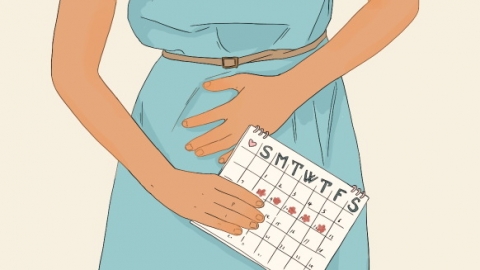Why do I have cramps but haven't gotten my period yet? What should I do?
Generally, "yima" refers to menstruation. Experiencing abdominal pain without the onset of menstruation may be related to hormonal changes, mental stress and emotional fluctuations, pregnancy, gastroenteritis, pelvic inflammatory disease, and other factors. If discomfort occurs, timely medical consultation is recommended for treatment under the guidance of a qualified physician. Detailed explanations are as follows:

1. Hormonal Changes
Prior to menstruation, women experience hormonal fluctuations, which cause the uterine lining to begin shedding, leading to uterine contractions that may cause abdominal pain. Typically, this type of pain does not last long, and menstruation begins shortly afterward.
2. High Mental Stress
Stress from study, work, or life can cause mental tension, potentially leading to endocrine system disorders in women, thus affecting the menstrual cycle. This may result in abdominal pain while menstruation is delayed. Learning time management and stress-relief techniques such as regular exercise, meditation, and communication with friends can help alleviate stress and relax the mind.
3. Pregnancy
After becoming pregnant, hormonal changes in a woman's body may cause mild abdominal pain, accompanied by symptoms of early pregnancy such as amenorrhea (absence of menstruation), nausea, and vomiting. If there has been unprotected sexual intercourse recently, pregnancy should be considered as a possibility.
4. Gastroenteritis
Gastroenteritis may be caused by consumption of contaminated food or exposure to cold temperatures. When women are approaching their menstrual period, their immunity may relatively decrease, allowing pathogens to invade and cause gastrointestinal inflammation, resulting in abdominal pain. Symptoms typically include belching, diarrhea, and nausea. Treatment usually follows medical advice and may involve medications such as Cefaclor Dispersible Tablets, Amoxicillin Capsules, and Ganciclovir Tablets.
5. Pelvic Inflammatory Disease
Pelvic inflammatory disease is caused by infection of the pelvic organs and surrounding tissues by pathogens. Inflammatory stimulation may not only lead to delayed menstruation but also cause pelvic edema, which may compress surrounding tissues and cause abdominal pain. It is usually accompanied by symptoms such as difficulty urinating, increased vaginal discharge, and menstrual disorders. Treatment may follow medical guidance and include medications such as Azithromycin Tablets, Metronidazole Tablets, and Fuke Qianjin Tablets.
Maintaining good dietary habits and a regular lifestyle, avoiding excessive fatigue and emotional fluctuations, is essential for maintaining overall health.








